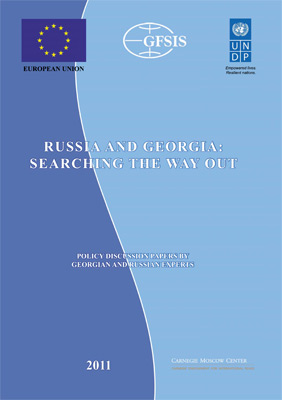Source: Georgian Foundation for Strategic and International Studies Report
 The given publication was issued under the project “Second Track—Georgian and Russian Experts Building Confidence” implemented by the Georgian Foundation for Strategic and International Studies (GFSIS). It contains policy papers and recommendations covering some of the most pressing and sensitive issues of the current Georgian-Russian relations prepared by both Georgian and Russian authors.
The given publication was issued under the project “Second Track—Georgian and Russian Experts Building Confidence” implemented by the Georgian Foundation for Strategic and International Studies (GFSIS). It contains policy papers and recommendations covering some of the most pressing and sensitive issues of the current Georgian-Russian relations prepared by both Georgian and Russian authors.
This paper is made possible through the support provided by the European Union, the COBERM team of the United Nations Development Program Georgia, and the Carnegie Moscow Center.
There are moments in the history of bilateral relations between states in which there is no room left for diplomatic maneuvering and politicians and diplomats lack necessary resources to bring about essential change. Nonetheless, it proves obvious that regardless of the most detrimental circumstances the relations between the two countries cannot be stalled completely. Economic interests, human relations, common threats and other factors push us to think about solutions and search for different ways and opportunities.
Without intellectual efforts it is impossible to find a viable solution to the dire post-August 2008 reality, which put both Georgia and Russia in an extremely difficult situation. The intellectual product, which would help us to find ways to address the problem (or other related issues) should be derived from the “material” common for both sides of the conflict, suit their “market demand” and equally meet their expectations.
One could argue that no one in Georgia fully understands Russia. The same situation holds true in Russia—little is know about Georgia to Russians. That is why the experts of both countries—those who sincerely aspire to find the ways out—should learn to work together, to listen to each other and get to know what is acceptable or unacceptable for the other side.
The primary goal of the project was to set an example and to create precedent for such relations.
The main value of the prepared policy documents is that they do not present a one-sided view or interest. They do not aim at a specific target audience—be that a certain party, government or social group. The addressees of these policy recommendations include Georgians and Russians, officials at all governmental levels, as well as interested segments of the society. These policy papers will provide valuable insights and suggestions to the international organizations and other international actors involved in the conflict.
